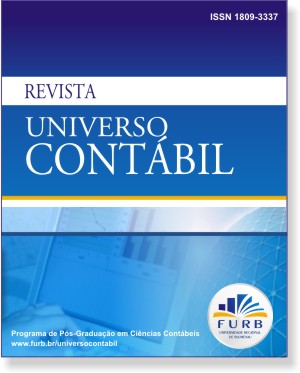PERCEPÇÃO DOS DISCENTES QUANTO À IMPORTÂNCIA DO CONHECIMENTO EM CONTABILIDADE TRIBUTÁRIA EM INSTITUIÇÕES DE ENSINO SUPERIOR DO DISTRITO FEDERAL: UM ESTUDO EMPÍRICO
DOI :
https://doi.org/10.4270/ruc.20084Mots-clés :
Ensino Superior, Contabilidade Tributária, Instituições de Ensino Superior.Résumé
A falta de conhecimento dos estudantes de graduação em Ciências Contábeis sobre assuntos tributários e a confusão que fazem sobre a Contabilidade e a Legislação Tributária são uma realidade crescente do ensino superior. Estudos indicam que um aluno motivado tem tendência a proporcionar maior importância ao conteúdo aprendido e assim ter maior interesse na captação da matéria. Desse modo, o objetivo da pesquisa é identificar o grau de importância que o estudante de graduação em Ciências Contábeis do Distrito Federal atribui aos assuntos tributários em suas Instituições de Ensino Superior (IES). O trabalho será conduzido pelo método de estudo de campo, utilizando-se o processo de amostragem não probabilística e com aplicação de questionário nas instituições de ensino superior com maior tradição do ensino contábil no Distrito Federal. Será feita a análise dos dados e, em seguida, explicado os resultados encontrados, demonstrando o destaque dado pelos estudantes ao conteúdo tributário. Os resultados da pesquisa demonstram que os alunos têm interesse pelo assunto, porém, não o vêem como mais importante para seu futuro profissional.Téléchargements
Téléchargements
Comment citer
Numéro
Rubrique
Licence
Os direitos autorais para artigos publicados nesta revista são do autor, com direitos de primeira publicação para a revista. Em virtude de aparecerem nesta revista de acesso público, os artigos são de uso gratuito, com atribuições próprias, em aplicações educacionais e não-comerciais. A revista permitirá o uso dos trabalhos publicados para fins não-comerciais, incluindo direito de enviar o trabalho para bases de dados de acesso público. Os artigos publicados são de total e exclusiva responsabilidade dos autores.
• O(s) autor(es) autoriza(m) a publicação do artigo na revista;
• O(s) autor(es) garante(m) que a contribuição é original e inédita e que não está em processo de avaliação em outra(s) revista(s);
• A revista não se responsabiliza pelas opiniões, ideias e conceitos emitidos nos textos, por serem de inteira responsabilidade de seu(s) autor(es);
• É reservado aos editores o direito de proceder ajustes textuais e de adequação do artigo às normas da publicação;
• O(s) autor(es) declaram que o artigo não possui conflitos de interesse.


